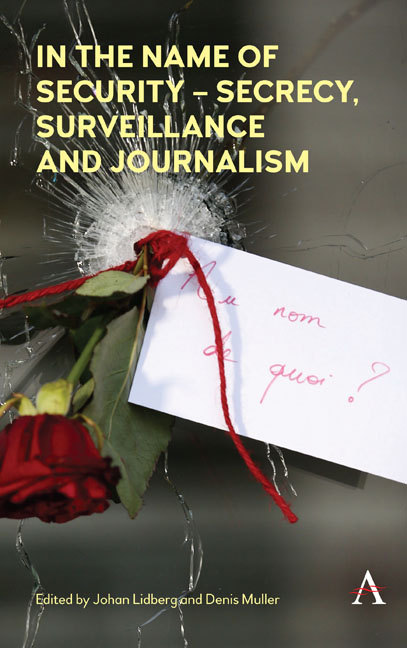Book contents
- Frontmatter
- Contents
- List of Tables
- Introduction
- Chapter 1 The Public Privacy Conundrum – Anonymity and the Law in an Era of Mass Surveillance
- Chapter 2 Undesirable Types – The Surveillance of Journalists
- Chapter 3 Surveillance and National Security ‘Hyper- Legislation’ – Calibrating Restraints on Rights with a Freedom of Expression Threshold
- Chapter 4 The Ethics of Reporting National Security Matters
- Chapter 5 When One Person's Noble Whistleblower Becomes Another's Poisonous Leaker
- Chapter 6 Who Watches the Watchmen? Access to Information, Accountability and Government Secrecy
- Chapter 7 Eyes and Ears in the Sky – Drones and Mass Surveillance
- Chapter 8 Looking over My Shoulder – Public Perceptions of Surveillance
- Chapter 9 Journalism and National Security in Three BISA Countries – Brazil, India and South Africa
- Chapter 10 Journalism and National Security in the European Union
- Chapter 11 The Security Reporter Today – Journalists and Journalism in an Age of Surveillance
- Conclusion: Journalism and the State of Exception
- Contributors
- Index
Chapter 4 - The Ethics of Reporting National Security Matters
Published online by Cambridge University Press: 21 June 2018
- Frontmatter
- Contents
- List of Tables
- Introduction
- Chapter 1 The Public Privacy Conundrum – Anonymity and the Law in an Era of Mass Surveillance
- Chapter 2 Undesirable Types – The Surveillance of Journalists
- Chapter 3 Surveillance and National Security ‘Hyper- Legislation’ – Calibrating Restraints on Rights with a Freedom of Expression Threshold
- Chapter 4 The Ethics of Reporting National Security Matters
- Chapter 5 When One Person's Noble Whistleblower Becomes Another's Poisonous Leaker
- Chapter 6 Who Watches the Watchmen? Access to Information, Accountability and Government Secrecy
- Chapter 7 Eyes and Ears in the Sky – Drones and Mass Surveillance
- Chapter 8 Looking over My Shoulder – Public Perceptions of Surveillance
- Chapter 9 Journalism and National Security in Three BISA Countries – Brazil, India and South Africa
- Chapter 10 Journalism and National Security in the European Union
- Chapter 11 The Security Reporter Today – Journalists and Journalism in an Age of Surveillance
- Conclusion: Journalism and the State of Exception
- Contributors
- Index
Summary
Introduction
As national governments enact increasingly restrictive laws about what may or may not be published in the interests of national security, the ethical requirements on journalists reporting in this field have become correspondingly more complex. Yet, in the face of these complexities, the requirements set out in professional codes of ethics do not yield. These obligations remain undiminished: to act in the public interest, to protect the identity of confidential sources, to avoid avoidable harm, to tell the truth as best it can be ascertained and to hold those in power to account.
This chapter discusses each of these obligations in the context of the legislative changes enacted in Australia since the 9/11 terrorist attacks on New York City and Washington. It also discusses the ethical challenges posed by the unprecedented availability of large amounts of previously secret data through the document dumps of Wikileaks and Edward Snowden. The availability of secret data tested many of the ethical obligations already mentioned, and placed strains on another cornerstone of journalistic ethics: editorial independence. Although this analysis is based on the Australian situation, the ethical challenges for journalists in democratic polities working under similar legal regimes are identical, given the universality of the ethical requirements on journalists (see, for example, Keeble 2001).
A Definitional Challenge
A threshold ethical duty for journalists when confronted by the possibility that a matter of national security might be at issue is to ask: Is this in fact a matter of national security? A former editor of the Age, Melbourne, Creighton Burns (1981– 1989), in discussing the possibility of a system of voluntary constraints on the media, identified, as a central problem, the development of a consensus on how ‘national security’ would be defined: ‘There are clearly things you would not publish and I believe editors should not put the lives of intelligence people at risk but, beyond that, I'm not sure how precisely “national security” can be defined. Often it simply means the comfort of the government of the day’ (Yallop 1995, 11).
- Type
- Chapter
- Information
- Publisher: Anthem PressPrint publication year: 2018

